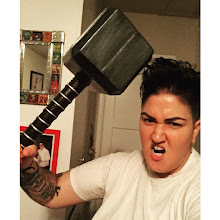The USS Enterprise NC-1701, built in 2245, is sent to planet Nibiru in order to examine a primitive civilization. The crew is called back home when they discover that a destructive force within has turned, threatening the Starfleet and everyone's future. In the sequel, and next installment of J.J. Abrams' Star Trek (2009) reboot, Star Trek Into Darkness serves as a character driven exploration of relationships among the crew, while keeping it an adventurous sci-fi ride.
I myself am not a Trekkie, but a Phile, versed in discovering similarities to The X-Files among the science fiction genre. This is why when Captain James T. Kirk (Chris Pine) gets stripped of his position as captain after exposing the Enterprise to Nibiru's civilization is not unlike Special Agent Dana Scully getting taken off The X-Files and transferred, both having their job performances evaluated. Kirk's mission to rescue First Officer Spock (Zachary Quinto) endangers his position, but the two continuously fight for each other through all the threats, with homoeroticism turned high. The relationship between Spock and Uhura (Zoe Saldana) is also tested, meanwhile Benedict Cumberbatch's villain wants to start a war with the Klingons. The performance by Cumberbatch is that of the film, stealing his scenes with a grandiose antihero snare. I was also impressed by the mesmerizing musical score by Michael Giacchino.
Much like a long Star Trek episode, there is a threat against facilities and personnel, with a final restore of the Enterprise to continue its mission. J.J. Abrams has some stunning planet surface shots, that I found myself so taken with the exploration, the dialogue got lost in space. One of the most memorable scenes is in the beginning of the film when Kirk and Bones (Karl Urban) are shown running through the beautiful red and white trees on planet Nibiru, where Abrams uses his signature camera lens flare. The use of 3D really brings truly spectacular space shots to life and closer, as if traveling yourself through space into darkness. Equipped with an '80s sci-fi ending, this is the final frontier.
I myself am not a Trekkie, but a Phile, versed in discovering similarities to The X-Files among the science fiction genre. This is why when Captain James T. Kirk (Chris Pine) gets stripped of his position as captain after exposing the Enterprise to Nibiru's civilization is not unlike Special Agent Dana Scully getting taken off The X-Files and transferred, both having their job performances evaluated. Kirk's mission to rescue First Officer Spock (Zachary Quinto) endangers his position, but the two continuously fight for each other through all the threats, with homoeroticism turned high. The relationship between Spock and Uhura (Zoe Saldana) is also tested, meanwhile Benedict Cumberbatch's villain wants to start a war with the Klingons. The performance by Cumberbatch is that of the film, stealing his scenes with a grandiose antihero snare. I was also impressed by the mesmerizing musical score by Michael Giacchino.
Much like a long Star Trek episode, there is a threat against facilities and personnel, with a final restore of the Enterprise to continue its mission. J.J. Abrams has some stunning planet surface shots, that I found myself so taken with the exploration, the dialogue got lost in space. One of the most memorable scenes is in the beginning of the film when Kirk and Bones (Karl Urban) are shown running through the beautiful red and white trees on planet Nibiru, where Abrams uses his signature camera lens flare. The use of 3D really brings truly spectacular space shots to life and closer, as if traveling yourself through space into darkness. Equipped with an '80s sci-fi ending, this is the final frontier.


Comments
Post a Comment